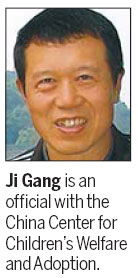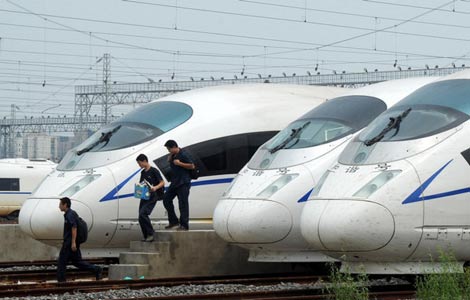China to tighten adoption measures
Updated: 2011-08-16 07:28
By He Dan and Guo anfei (China Daily)
|
|||||||||||
Orphanages will play pivotal role in move to tackle trafficking of children
BEIJING - The government is toughening rules to tackle the scourge of child trafficking, including making orphanages the only institutions that can offer abandoned children for adoption, an official said.
"Illegal adoption", whereby adults can adopt without official registration, will also be targeted.
|
 |
The draft of the rules, due to be introduced by the end of the year, will force adults to go through official channels and reduce the demand for abducted children, he added.
The Registration Measures for the Adoption of Children by Chinese Citizens has been in place since 1999. It stipulates that a citizen can adopt a child from sources other than an orphanage if the applicant does not have any offspring and meets certain requirements in terms of age, health and financial status.
As a result, children have been adopted through various routes, such as hospitals and friends.
This was a system that allowed certain people to profit from adoptions.
According to the revised rules, to be worked out jointly by the Ministry of Civil Affairs and CCCWA, all abandoned infants and young children should be sent to orphanages for adoption, Ji said.
Once the new rules take effect, children adopted without the input of an orphanage will not be allowed to have a hukou, or household registration permit, Ji added.
On top of this, parents of illegally adopted children will not be recognized as legal guardians, Ji said. “Therefore, illegally adopted children do not have any legal responsibility to take care of their parents when they get old.”
But tackling unregistered adoptions will not be easy as the practice is deep-rooted, especially in poor areas, Ji admitted.
Illegal adoption is prevalent in rural and economically less-developed areas, Ji said, citing a study conducted by CCCWA in 11 regions and municipalities.
The study shows that from 1992 to 2005, about 19,800 children were adopted illegally in Chongqing municipality, while the number of legal adoptions registered with the local civil affairs departments was only 5,100.
The situation is better in big cities such as Beijing and Shanghai, where people “are better educated and have a stronger sense of the law”, Ji said.
Chen Shiqu, who heads the anti-trafficking office at the Ministry of Public Security, said that most of the abducted children were sold to childless couples to carry on the family line and guarantee security in old age.
Only a small portion of trafficked children were forced to beg on the streets, Chen said.
Official statistics show that the police have rescued 14,613 abducted children throughout the country since 2009.
Zhang Wenjuan, deputy director of Beijing Children’s Legal Aid and Research Center, said that the government should work on establishing a sound social welfare system to tackle the problem of abandoned children and “illegal adoption”.
Some parents abandon their children due to poverty or because they cannot afford expensive medical fees if their children suffer from severe diseases. These situations can be avoided if the government provides more financial help and affordable health services, Zhang stressed.
Meanwhile, the government should try to improve the pension system, especially in China’s vast rural regions, to prevent people from buying children as a guarantee for old age, said Ge Daoshun, an expert on social policy at the Chinese Academy of Social Sciences.
Zhang Yan contributed to this story.
Related Stories
Cross-border human trafficking cases rising 2011-08-12 08:02
Police crack huge human trafficking operations 2011-07-27 07:37
Police bust huge human trafficking rings 2011-07-27 07:05
Anti-trafficking campaign rescues 27,388 2011-07-14 13:45
Hot Topics
Rainstorms cause flooding in Gannan Tibet autonomous prefecture, Gansu province, on August 15, 2011.
Editor's Picks

|

|

|

|

|

|







